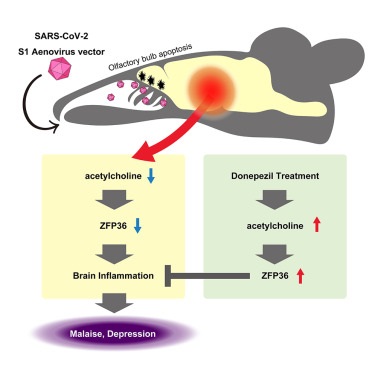BREAKING NEWS! Study Reveals Link Between SARS-CoV-2 and Brain Inflammation: A Potential Breakthrough for Long COVID Treatment
COVID-19 News - SARS-CoV-2 - Brain-Inflammation May 28, 2023 2 years, 6 months, 4 weeks, 1 day, 22 hours, 46 minutes ago
COVID-19 News: In a groundbreaking study conducted at the Jikei University School of Medicine in Tokyo, researchers have made a remarkable discovery that could shed light on the neurological complications associated with SARS-CoV-2, the virus responsible for COVID-19. The study found that the S1 protein of the virus, when expressed in the nasal cavity of mice, led to a significant decrease in acetylcholine production in the brain, ultimately causing brain inflammation, malaise, and depressive symptoms. This new study finding has the potential to revolutionize our understanding of Long COVID and pave the way for effective treatments to alleviate its debilitating effects.
 Graphical Abstract
The Mysteries of Neurological Complications in COVID-19
Graphical Abstract
The Mysteries of Neurological Complications in COVID-19
Since the onset of the COVID-19 pandemic, researchers and medical professionals have observed a range of neurological complications in infected individuals as covered in various studies and past
COVID-19 News reports. These complications, including olfactory dysfunction, fatigue, and depressive symptoms, have been identified as significant contributors to Long COVID i.e a condition characterized by the persistence of symptoms even after the initial infection has resolved. However, until now, the mechanisms behind these neurological manifestations have largely remained a mystery.
Autopsy results of COVID-19 patients have not shown direct evidence of viral proliferation in the central nervous system, suggesting that other factors may be at play. To unravel this mystery, the researchers at Jikei University School of Medicine focused their investigation on the S1 protein of SARS-CoV-2, known for its calcium-elevating activity in cells.
Unveiling the Link: SARS-CoV-2 S1 Protein and Brain Inflammation
By expressing the S1 protein in the nasal cavity of mice, the study team successfully replicated neurological complications similar to those observed in COVID-19 patients.
The mice exhibited damage to the olfactory bulb, brain inflammation, fatigue, and depressive clinical signs.
The decrease in acetylcholine production in the brain, coupled with reduced expression of the cytokine degrading factor ZFP36, was found to be the underlying cause of these symptoms.
Furthermore, it was discovered that the severity of calcium elevating activity in different SARS-CoV-2 strains correlated with their respective severity and mortality rates. This intriguing finding adds another layer to our understanding of the virus's pathogenicity.
The Role of Acetylcholine and Potential Treatment<
;br />
Acetylcholine, a neurotransmitter responsible for various brain functions, plays a vital role in maintaining brain health.
The study team observed a decrease in acetylcholine production and disrupted cholinergic anti-inflammatory pathways in the S1-expressing mice, leading to brain inflammation and other clinical signs.
This finding suggests that severe damage to the olfactory bulb caused by SARS-CoV-2 may be a primary driver of the compromised cholinergic system.
To mitigate the pathological state observed in the mice, the study team administered donepezil, a cholinesterase inhibitor commonly used to treat dementia.
The results were remarkable - donepezil reversed brain inflammation, reduced apoptosis in the olfactory bulb, and alleviated fatigue and depressive symptoms.
The study also highlighted the importance of ZFP36 production, which could potentially be promoted through the development of α7nAchR agonists for suppressing brain inflammation.
Implications and Future Directions
The implications of this study are far-reaching. By uncovering the link between the S1 protein, acetylcholine production, and brain inflammation, the study team has opened doors to the development of targeted treatments for long COVID.
Donepezil, a well-established drug with a good safety profile, holds promise to be repurposed for the treatment of brain inflammation and neurological complications associated with COVID-19.
Clinical trials are now needed to validate the effectiveness of donepezil in treating brain inflammation in COVID-19 patients. If successful, this drug could provide much-needed relief for individuals suffering from long COVID and offer hope for a faster recovery.
Furthermore, the study's findings on the relationship between the S1 protein, calcium elevation, and olfactory bulb damage have broader implications beyond COVID-19.
The study team believe that this molecular mechanism could help explain the onset of encephalopathy caused by various factors, including other viruses and autoimmune disorders. Understanding the role of calcium elevation and its impact on brain function may open new avenues for treating and preventing neurological conditions beyond COVID-19.
The study also emphasizes the significance of the cholinergic anti-inflammatory pathway (CAP) in maintaining brain health. The disruption of the CAP due to decreased acetylcholine production highlights the importance of preserving the cholinergic system's function. Exploring novel approaches to enhance CAP activity, such as α7nAchR agonists, could hold potential for managing brain inflammation and related symptoms in COVID-19 and other neurological disorders.
Conclusions
The groundbreaking study conducted at Jikei University School of Medicine has unveiled a significant link between the SARS-CoV-2 S1 protein, brain inflammation, and decreased acetylcholine production. These study findings provide valuable insights into the pathogenesis of neurological complications associated with COVID-19, including long COVID. The potential repurposing of donepezil and the exploration of CAP-enhancing strategies offer promising avenues for the development of targeted treatments. As the world eagerly awaits further research and clinical trials, these discoveries bring hope and the possibility of a brighter future for those affected by the long-lasting consequences of COVID-19.
The study findings were published in the peer reviewed journal: iScience.
https://www.cell.com/iscience/fulltext/S2589-0042(23)01031-3
For the latest
COVID-19 News, keep on logging to Thailand Medical News.
Read Also:
https://www.thailandmedical.news/news/covid-19-news-russian-study-finds-that-sars-cov-2-infections-can-cause-cholinergic-deficiency-leading-to-various-serious-health-conditions
